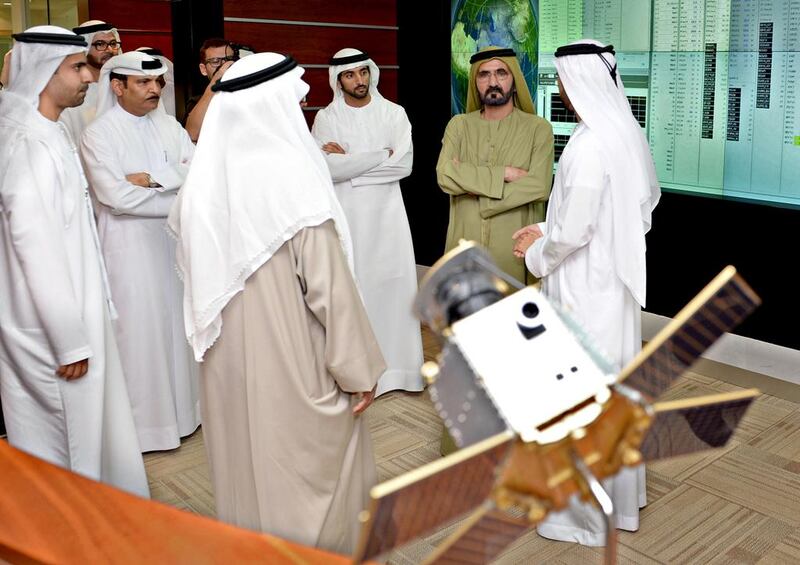ABU DHABI // Dubai will reach for the stars with the first 100 per cent Arab satellite designed and built by Emiratis.
The newly named Khalifa-Sat will be manufactured at the Emirates Institution for Advanced Science and Technology in Dubai and is expected to be launched in 2017.
It will be the UAE’s fifth satellite – Abu Dhabi and Dubai already have two each – but the first to be a wholly Emirati project without external partners.
Inaugurating the project on Sunday, Sheikh Mohammed bin Rashid, the Vice President and Ruler of Dubai, drew a comparison between the Arab world's history of creative innovation and the talents of a new generation of young Emirati scientists.
“Our history says that Arab and Muslim scientists gave the world great achievements. We continue to believe that the same creative spirits run in their children,” Sheikh Mohammed said on a visit to the technology institution’s headquarters in Al Khawaneej in Dubai.
“The excellence of our youth in space sciences, engineering and energy opens great developmental prospects for the UAE …and new places we step into for the first time.
”All Arabs are innovators … our job is to create the right environment for them.
“Khalifa-Sat is a message to all Arabs that ushering in the space era is neither out of reach nor impossible, and our State will be a leader in this industry as long as we have the confidence and courage to enter into competition with major countries in this field.
“We are extremely delighted at seeing sons and daughters of the UAE forming the first Arab team to build a satellite and launch it into space in 2017 … our confidence in them is boundless.”
Sheikh Mohammed said he would personally follow up on the progress of the Khalifa-Sat project team, and the Government would set up similar teams in other fields.
“When I look at the outstanding Emirati performers I always say this is what the late founding fathers Sheikh Zayed … and Sheikh Rashid … planted, and today we are harvesting the fruits for building the capacities of Emirati citizens.”
Salem Al Marri, EIAST’s assistant director general for scientific and technical affairs, has told The National they were working on a facility to help Dubai to become self-sufficient in building satellites. The grounds will be complete with a development laboratory and a thermal chamber to test satellites.
The Khalifa-Sat, previously called DubaiSat-3, will be EIAST’s third such project.
Its first satellite, DubaiSat-1, was launched in 2009 on a Russian-made Dnepr-1 rocket from the Baikonur Cosmodrome in Kazakhstan.
The satellite has been beaming back images that have helped international authorities in disaster recovery after Pakistan’s floods, and Japan’s tsunami and nuclear crises.
The satellite images have also been used locally to monitor shoreline erosion and the effects of harmful algal blooms.
DubaiSat-2 was launched in November from the Yasny Launch Base in Russia. The satellite’s first images have already been beamed back to Dubai, with much greater clarity than its predecessor and with much more frequency.
About 30 per cent of DubaiSat-1 was built by Emiratis, and UAE engineers are responsible for about half of DubaiSat-2’s design and manufacturing, with the South Korean company Satrec1 helping with the rest. Abu Dhabi’s first satellite, Yahsat Y1A, was launched in April 2011.
The satellite provides communications for government and commercial customers. It also beams down high-definition television broadcasts to countries in the Middle East, Asia and Africa.
The second satellite, Y1B, was launched in April 2012 from Kazakhstan. Y1B provides commercial broadband internet.
osalem@thenational.ae






